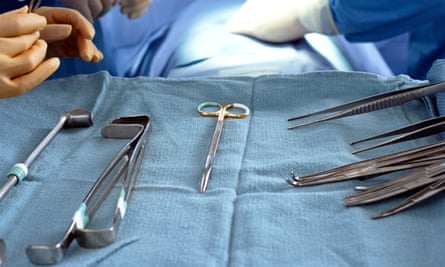A major private hospital group says it has experienced a doubling in the number of patients opting to pay out of their own pocket for a range of procedures because they fear they will not be seen because the NHS is struggling with a backlog of operations.
HCA Healthcare, which runs some of the best-known private hospitals in London, including the Portland and the Lister, as well as providing private care at Guy’s, said: “We have seen double the number of self-pay procedures in hip surgeries, ophthalmology (cataracts) and abdominal procedures on last year.
“People are also coming to our London hospitals from further afield than normal, particularly from the south and south-west of England where we have seen 25% to 35% more self-pay patients.”
Spire Healthcare, which runs 39 private hospitals across the UK, also reported an upsurge. Its chief operating officer, John Forrest, said: “The biggest increase in inquiries has come from patients needing orthopaedic, obstetrics/gynaecology and ophthalmology care. These are people often suffering from debilitating conditions who might otherwise have to wait many months for treatment.”
NHS England figures show that in June, more people than ever before – 1.85 million – were waiting longer than 18 weeks for planned hospital surgery, such as knee and hip operations. The numbers waiting for more than a year for hospital treatment jumped from 1,000 to 50,500.
But it is working hard to restore non-Covid services and patients are urged to seek help from the NHS when they need it.

The cost of paying direct will the biggest deterrent for anyone hoping to skip any NHS queues. Price lists are difficult to find on most private hospital websites – and each patient is different – but research by the medical insurance brokers myTribe earlier this year into prices around London and southern England revealed the eye-watering fees charged on the most popular procedures. It found:
A hip replacement would cost £14,050 at one of HCA’s London hospitals, dropping to £11,676 at a BMI hospital in Hampshire, with the average cost in its sample at £12,857.
Knee replacement surgery cost £13,050 at the Nuffield Wessex hospital outside Southampton and £14,850 at HCA in London, with the average at £13,067.
Cataract surgery on one eye cost an average of £2,513, ranging from £2,270 at the Ramsay New Hall hospital in Salisbury to £2,785 at Nuffield Wessex.
Separate research in 2019 by the healthcare consultancy LaingBuisson found huge regional variations within the same hospital groups. For example, a hip replacement cost £8,110 at the Spire Murrayfield in Edinburgh but £15,050 at the Spire Harpenden in Hertfordshire.
Despite sky-high prices, self-pay has become an increasingly large part of the private healthcare market, with individuals in the UK spending about £1.7bn a year on treatments and making up about 20% of the revenue of private hospitals.
Private medical insurance policies can be a cheaper way to access healthcare than paying direct, but not if you are seeking urgent treatment, especially for a pre-existing condition. “You don’t try to buy home insurance when the house is burning down,” said Chris Steele, the director of myTribe.
Company-paid cover accounts for about 75% of the roughly 4 million people who have private medical insurance in the UK, with the market dominated by a handful of big players such as Bupa, Axa PPP (currently being rebranded as Axa Health) and Aviva.
If you choose to buy an individual policy, the cost will depend on numerous factors, escalating sharply as you age, from just under £1,000 a year for a healthy 30-year-old through to £6,000 or more for someone approaching 80 years old. Most insurers have maximum age caps for taking out cover and anyone over 80 will find it difficult to obtain a policy.
Age, location, pre-existing conditions and smoking will all influence the price you pay. If you indicate you want to use hospitals in London you should expect to pay significantly more, while smokers can expect premiums to be about 10% higher. Gender makes little difference.
The price will also depend on the excess – which is the amount you pay for each claim. This can range from zero to £1,500 and the higher the excess selected, the lower the premium cost. On most policies you pay the excess just once, with no further excess applied to treatments within the year the policy covers.
We asked myTribe for typical costings for comprehensive cover for people in different age ranges, assuming a £100 excess and that the person does not smoke.
It said a 30-year-old would pay about £69 a month/£828 a year; a 40-year-old £85 a month/£1,020 a year; a 50-year-old £115 a month/£1,380 a year; and a 60-year-old £175 a month/£2,100 a year.
The vast majority of new policies are written on what is called a “moratorium” basis, which means pre-existing conditions for which you have received any advice, treatment or follow-up in the past five years are automatically excluded. Because of that, insurers do not need you to send in a medical history. But when you make a claim, they will ask your GP if the condition was there prior to your policy start date.
As for whether an existing policy will cover you for treatment related to coronavirus, in medical emergencies private healthcare is of little use. The insurers generally say they do not cover testing and screening and expect the NHS to provide for any Covid-19 treatment.
During the emergency stage of the pandemic, with many private healthcare facilities taken over by the NHS, obtaining elective surgery proved very difficult – and in any case, many people did not want to visit a hospital. One provider, WPA, said there was a “notable reduction” in private medical claims during the lockdown and has since issued two refunds to customers, worth about 7% of its revenue. But other insurers are yet to follow suit, arguing that pent-up demand will cause claims to rise rapidly in coming months.
